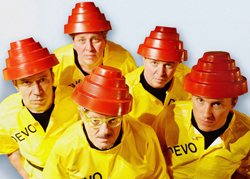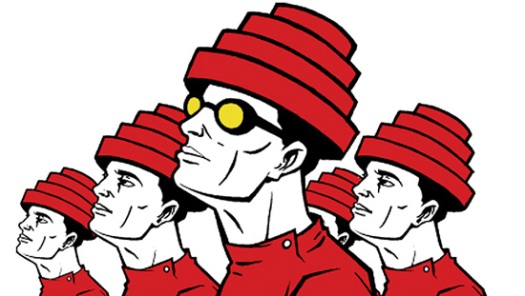
Image Courtesy Gerald Casale
Scrunchies. Jazzercise. The Gremlin car, in all its hatchback deformity. Cone-shaped bras. Jell-o fruit salad. Members Only jackets. Hammer pants. Over the course of a decade, countless trends have lit the pop-culture landscape and receded into obsolescence. What is it, then, that endures about Devo? Why does their 1978 album, Q: Are We Not Men? A: We Are Devo, still sound timely nearly 40 years later. Why do their energy-dome hats still look awesome? We met with Devo’s Jerry Casale over several months to find out. In this, the third installment of our exclusive Devo interview series, Sara Jayne Crow delves into the origins of “energy-dome” hats, explores the pending McDonald’s lawsuit, and encounters the ghost of lawsuits past.
Flavorpill: Let’s talk about the beginnings of Devo, back when people lobbed beer bottles onstage while you performed. Before Saturday Night Live, before Warner Brothers records, before the lawsuits…
Jerry Casale: In a slightly different scenario, it could’ve been that the real beginning of Devo was also the end. It could’ve been over, and nothing else would have happened. We would never have had a body of work, or a history. And that’s how narrow the difference is. It’s like the whole story of Tesla.
FP: I love that you brought up Tesla right now.
JC: Why?
FP: It’s just poetic.
JC: That’s a great story. He was an amazing artist, and his legacy was besmirched. He was erased from history. Except for people like us, who know about him. That’s how it can go. That’s the difference… just that much.
FP: That’s sort of the human condition, isn’t it?
JC: That’s right. There are plenty of people today in the wrong place at the wrong time. Like the massive rape in Africa, and the People’s Democratic Republic of the Congo, or whatever the fuck it is. It’s horrifying. Where’s the great United States justice there?
FP: America is normally so obtrusive in foreign affairs. But in the case of the Congo, it’s not financially solvent, and the pain and suffering continues.
JC: The pain and suffering is unbelievable.
FP: So where do you think this is all going? All the pain, suffering, strife, pollution, devolution?
JC: There’s just going to be more and more of it. There aren’t enough powerful, good people in the world to stop the freight train of history into the black hole. There are too many evil people and subhuman victims that aren’t equipped to resist any more. The saddest thing of all is in American politics, where blue-collar people are the worst in terms of being affected by heinous policies of the Federal government that penalizes them and drives them further and further into the dirt. They are the most tricked by the very people that perpetrate their victimization. These are the people that voted twice for Bush and probably voted for McCain and Palin.
FP: Time for another tea party? Back to the beginnings of Devo question… let’s talk about something devoid of politics and pain. How about where the idea for the “energy dome” hats come about?
JC: The idea originally came from a comic book about a cancellator helmet. The character in the comic book wore the helmet so she couldn’t hear, and it made her happy because it blocked out babble from the outside world. It looked a little bit like a ceiling fixture I used to fixate on in my [Catholic] grade school. Because I hated the nuns so much, I would stare at the ceiling so I wouldn’t have to look at them. If you could imagine the energy domes turned upside down in white milk glass, they looked exactly the same. I used to love the design. And I thought, “We should make a vacuum-formed plastic hat that looks like that for Devo.” And so I set about trying to make it.
At some point, a worker in the production factory we were using asked if we were making flower pots, and I spontaneously said we were making energy domes because he pissed me off. If we gave interviews, we talked about Wilhelm Reich’s orgone box, and added that to the story after the fact. To begin with, it was more about visual design and a ridiculous idea for a hat.
FP: So what’s up with the Devo lawsuit with McDonald’s over the “New Wave Nigel” happy meal toy whose hat looks mysteriously like those hats?
JC: You know, it’s very funny. You know… McDonald’s is so frightening with the legal process that I realized how power works, true power, all over again. Even I was surprised by how avaricious it was. I’m not allowed to tell you a thing about this, or they can sue me… But there was no lawsuit.
FP: Can you at least talk about why you filed the suit?
JC: They had a promotion for Happy Meals where each decade of was represented by different characters, the ’50s, ’60s, ’70s, ’80s, ’90s and now. Oddly enough, the ’80s character, which was the “New Wave Nigel” doll, did appear to us to be Devo. I can’t talk about it. I like how the victim becomes the victim, again.
FP: That’s been a theme, hasn’t it?
JC: Absolutely. It never stops. Whatever happened with McDonald’s… McDonald’s is a powerful corporation, and it creates reality, like Karl Rove. What they say goes. Even though we felt we were the victims, we were being treated like perpetrators and troublemakers. The fact that we’re not allowed to talk about it… you needn’t say more than that. By saying what I’m saying, I’m talking about it. That’s the problem.
It’s like the first time we were ever sued. We were sued less than every band, I think. The biggest and most furious one was where former friend and associate at Kent [State University], Bob Lewis, trumped up a suit about Devo about theft of intellectual property, which was ludicrous. Really, it was about a kid from Akron University’s college paper who tricked Mark into saying Bob Lewis was our manager, which was totally not true. Two years later, when we were getting ready to tour, and had a real manager — Elliot Roberts, who managed Neil Young, The Cars, Joni Mitchell and Bob Dylan. This guy pulls out this tape and tries to injunct our tour, so we were forced to settle. He tried to claim that was proof his case of theft of intellectual property was real, which was totally ridiculous. It would make a great movie in and of itself, because then everyone starts arguing about the reference points for de-evolution and where it came from…
FP: Isn’t that the most devolved argument you can have?
JC: I know! Did it come from the comic book, did it come from The Island of Lost Souls, who said what first, and we were all acknowledging that we got this idea from pre-existing sources: even the song title “Jocko Homo” came from a religious pamphlet. The point is that these are influences of artistic people, and the ideas don’t belong to anyone, on that level. What may be Devo is the fact that Mark and I wrote songs with certain lyrics and played songs a certain way. That’s what made Devo, Devo. Not who read what book first.
FP: In some ways, the “New Wave Nigel” character, McDonald’s was homage to Devo.
JC: They were using a copyrighted icon that I created without asking permission. The point is, we don’t approve of what McDonald’s represents. If we had, maybe the homage would have been a compliment to us.
FP: Wasn’t there a band you were in called 15-60-75?
JC: Yes, I played both bass and drums at different times in that band.
FP: You were quoted at one point as saying that you wanted to write McDonald’s jingles with the band, because that’s what was familiar to people and was part of the mental landscape of the general populous whether they knew it or not.
JC: We were inspired by early McDonald’s advertising, because we were so horrified by it. We wanted to subvert what people liked. We wanted to take it and misappropriate it, or be transgressive about it. In our early videos, we would watch McDonald’s commercials and see what they did-we learned how to do our shot selection and edit from McDonald’s commercials. But then we mixed it with German expressionism and horrific twists to screw with people. It’s like in the “Beautiful World” video, where we show some really ridiculous, humorous image and then a starving child in Africa right after it.
FP: It’s taking the familiar editing precepts and making it into something subversive and appealing via shock, which has far more of an impact.
JC: It’s alienation by the familiar.
Related posts: Exclusive: Don’t Shoot, We’re Devo: Pt. 2
Exclusive: Devo’s Jerry Casale on De-evolution and the Meaning of ‘Whip It’
